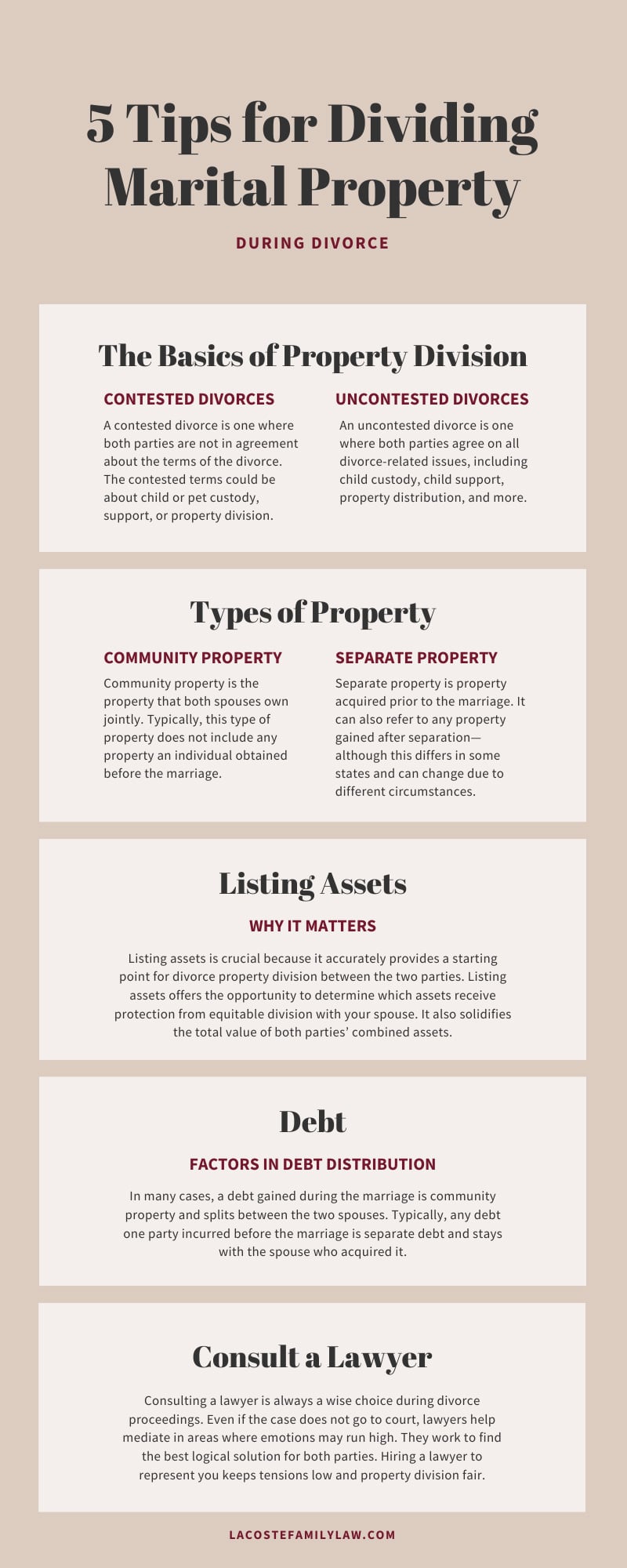
08 Sep 5 Tips for Dividing Marital Property During Divorce
Divorce is a hard occurrence in anyone’s life. And while it is not something that couples plan, it can eventually happen for various reasons. The ending of a marriage is not only difficult emotionally, but it can become complicated due to the finances and property division, too—especially if there is emotional animosity involved. Marital property division during divorce is an essential step in terminating the marriage.
During the highly emotional time that divorce brings, dividing property and assets can be overwhelming. Even in amicable divorces, there are always many items that can create tension and prompt disagreements. Read about these five tips for dividing marital property during divorce.
The Basics of Property Division
There are many things you must learn about during the process of divorce. One category of essential information is the basics of property division. This can be tricky, as married couples often share real estate, bank accounts, and many other items. In a divorce, they must divide these in a fair and balanced manner. Here is a brief breakdown of what you need to know in general about the property division process of contested and non-contested divorces.
Contested Divorces
A contested divorce is one where both parties are not in agreement about the terms of the divorce. The contested terms could be about child or pet custody, support, or property division.
These divorce types come with higher levels of conflict and more back and forth negotiations over the settlement terms. Contested divorces benefit from legal counsel to avoid proceeding to court. This can happen when couples cannot reach an agreement on their own nor with the help of a legal moderator.
Uncontested Divorces
An uncontested divorce is one where both parties agree on all divorce-related issues, including child custody, child support, property distribution, and more. If there are any significant issues that the couple cannot agree on, the divorce becomes contested. It then requires legal counsel or a trial where a judge can settle the disputes.
Types of Property
There is more than one type of property that couples must take into consideration during their divorce process. People must define all their property in cases of divorce. Here are the two primary categories of property that you and your spouse must consider during the divorce process and negotiations.
Community Property
Community property is the property that both spouses own jointly. Marital property typically refers to the property that one or both parties acquired during the marriage. Typically, this type of property does not include any property an individual obtained before the marriage.
Separate Property
Separate property is property acquired prior to the marriage. It can also refer to any property gained after separation—although this differs in some states and can change due to different circumstances. In some cases, the separate property also includes inheritances or gifts one party acquired before, during, or after the marriage.
Listing Assets
One of the most tedious steps in a divorce proceeding is listing all the assets between the married couple. This process is lengthy but entirely necessary. It is necessary to ensure there are no missing items or issues that can arise later. Both parties must be aware of the things at stake during the divorce process.
Why It Matters
Listing assets is crucial because it accurately provides a starting point for divorce property division between the two parties. Listing assets offers the opportunity to determine which assets receive protection from equitable division with your spouse. It also solidifies the total value of both parties’ combined assets.
What to List
Here are the things you should list when communicating your assets.
- Personal bank accounts
- Shared bank accounts
- Retirement accounts
- Personal credit cards
- Shared credit cards
- Real estate properties
- Vacation homes
- Income properties
- Land
- Cars, boats, motorcycles, and other vehicles
- High-value personal belongings, such as art, jewelry, antiques, and more
- Any debts, such as home loans, personal loans, auto loans, medical bills, credit card bills, student loans, etc.
- Any business properties or accounts
Debt
Many couples do not realize that debt is something they must disclose in divorce proceedings. As such, a tip for dividing marital property during a divorce is to talk about personal and joint debt. Much like assets, debts during the marriage are also considerations during property division. Here are the debts to list—whether or not they have direct connections with the other spouse’s name.
- Home loans
- Equity loans
- Auto loans
- Personal loans
- Credit card bills
- Medical bills
- Student loans
Factors in Debt Distribution
As with other aspects of property division, debt distribution differs based on debt type, when the individual acquired the debt, and who the logical owner of the debt is. In many cases, a debt gained during the marriage is community property and splits between the two spouses. Typically, any debt one party incurred before the marriage is separate debt and stays with the spouse who acquired it.
There are many factors in deciding where debts go during a divorce. If your financial situation is complicated, it may be in the best interest of both parties to consult a lawyer.
Consult a Lawyer
Consulting a lawyer is always a wise choice during divorce proceedings. Even if the case does not go to court, lawyers help mediate in areas where emotions may run high. They work to find the best logical solution for both parties. Hiring a lawyer to represent you keeps tensions low and property division fair.
Dividing property can often result in a tense situation and debate during divorces. Hiring a lawyer keeps you informed about expectations for you so that there is no misinformation or confusion during the tricky process.
If you are considering or currently going through a divorce, ensure that you look for a qualified property division lawyer in Washington State to represent you. LaCoste Family Law is a client-focused firm that prioritizes excellence in modern family law. Our staff has valuable experience helping couples who are going through a divorce. Contact us today for a legal consultation.


